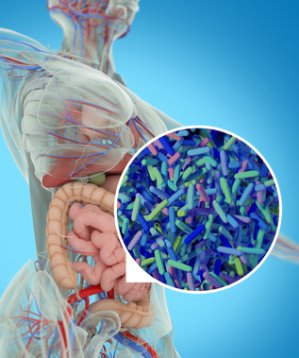Omega-3 fatty acids benefit the gut flora
 More and more studies show how important our digestion and gut flora are for our health and mood. A new study published in Scientific Reports reveals that omega-3 fatty acids are able to influence positively the diversity of our gut flora.
More and more studies show how important our digestion and gut flora are for our health and mood. A new study published in Scientific Reports reveals that omega-3 fatty acids are able to influence positively the diversity of our gut flora.
Our gut flora consists of around 50,000 billion bacteria and about 700 different species that produce various compounds. It helps the body handle harmful microorganisms, it improves our digestion, and it produces various vitamins and signaling substances that affect our immune system, our nervous system, and our hormone system. The different types of bacteria keep each other in check in a delicate balance. However, the modern, refined diet that most of us consume and the use of antibiotics may easily reduce the diversity of the gut flora with a negative impact on digestion and the many functions that are normally undertaken by the intestinal flora. It is commonly known that bitter substances, lactic acid bacteria (probiotics), and certain types of fiber (prebiotics) have a positive influence on the gut flora. According to the new study, omega-3 fatty acids are able to stimulate the growth of other beneficial microorganisms.
You are never aloneDid you know that we humans consist of 10 per cent skin cells and 90 per cent bacterial cells that cover our skin and mucosa? Most bacteria are found in the enormous gut flora, which weighs around 1-2 kilos. |
DHA is the omega-3 fatty acid with the strongest influence
The study investigated the relation between omega-3 fatty acids, gut flora diversity, and stool characteristics in middle-aged and older women. The researchers analyzed data from 876 twin pairs, and with help from dietary questionnaires, they were able to calculate how much omega-3 the twins consumed.
They found a clear and significant relation between total omega-3 content in the blood and gut flora diversity, which the scientists could measure by using the Shannon index. They found the strongest link between gut flora diversity and the omega-3 fatty acid, DHA, which is found in fish oil. Even when they adjusted for intake of dietary fiber, the scientists could see a link between omega-3 and gut flora.
The researchers particularly noticed an increased presence of bacteria from the Lachnospiracea family. These bacteria are believed to protect against colon cancer by producing butyric acid (also known as butanoic acid).
Omega-3 fatty acids - fish or supplements?
Most people fail to eat the recommended amount of fish, which is around 350 grams of fish every week (preferably with 200 grams coming from oily fish that is rich in EPA and DHA). For those who do not like the taste of fish or who simply do not eat enough oily fish, a daily supplement is a good alternative. Fish oils based on free fatty acids provide good bioavailability. Make sure to choose a product that complies with government regulations with regard to peroxide count and content of environmental toxins.
Omega-3 fatty acid content (per 100 grams)
|
Our gut flora also benefits from vegetable oils
The Danish professor, Oluf Borbye Pedersen, and his colleagues have demonstrated that having an imbalance in the 700 difference bacterial types may harm your health. According to Borbye Pedersen, shifting to a more plant-based diet with vegetables, berries, nuts, almonds, seeds, and kernels may help change in a positive direction the diversity of the different type of bacteria. This change is seen within a few days.
References
Cristina Menni et al. Omega-3 fatty acids correlate with gut microbiome diversity and production of N-carbamyglutamate in middle aged and elderly women. Scientific Reports 2017
https://www.nature.com/articles/s41598-017-10382-2
https://en.wikipedia.org/wiki/Lachnospiraceae
http://frida.fooddata.dk/
http://livsstil.tv2.dk/2016-07-18-her-er-professorens-groenne-energigroed-saadan-faar-du-en-sund-tarm
Pernille Lund. Immunforsvarets nye ABC. Hovedland 2012
Search for more information...
- Created on .








